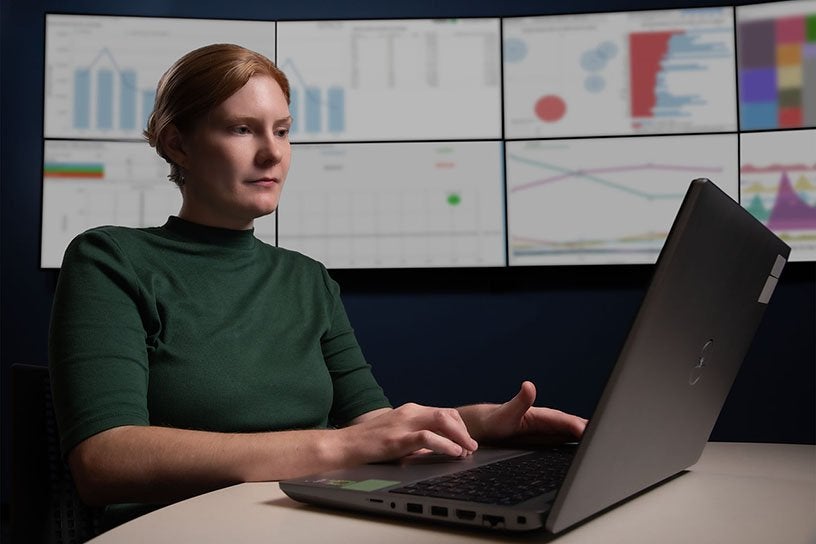Above: Brianna Brunson ’21 (M.S. ’22) works as a data scientist at Naval Information Warfare Center Atlantic. (Photo by Joe Bullinger)
When it comes to coding a computer program or solving a math problem, there has to be a certain sequence for things to come out right. That’s something College of Charleston alumna Brianna Brunson ’21 (M.S. ’22) can appreciate because it was just the right chain of events that led her to becoming a data scientist on the Command Data team at Naval Information Warfare Center (NIWC) Atlantic in North Charleston, South Carolina.
The first link in the chain began with Erin Langenstein ’19 (M.S. ’20) getting Amy Langville as her professor and mentor in the College’s Department of Mathematics. That connection led to Langenstein’s decision to get her undergraduate degree in mathematics and go on to earn her master’s in mathematical sciences with a concentration in statistics at CofC. The summer after graduating with her bachelor’s degree, she interned with NIWC Atlantic’s Defense Health IT Division as a predictive analyst and built an application that predicted the likelihood of veteran overdose. Staying on part time while earning her master’s, Langenstein built other models, including one that tracks and predicts bed occupancy rates in military hospitals, and another that predicts hearing loss among veterans.
It’s no surprise, then, that NWIC Atlantic hired her as a data engineer after she completed her master’s degree. About a year later, Langville reached out to Langenstein because she wanted to offer students in her Operations Research class a more real-world learning experience.
“The main reason for working with NIWC was Erin being there,” Langville says. “She was a rockstar student as an undergrad and grad student here. I’d run in to her from time to time while she was at NIWC, but also still at CofC, and it seemed like she always had such interesting projects she was working on.”
The timing was perfect. NIWC Atlantic wanted to test the Military Health System and tasked Langenstein with creating copious amounts of test data to do so. As the world becomes more data driven, having reliable, safe test data is vital, but the quantity needed is more than anyone could create manually.
That’s where a small cadre of CofC students – including Brunson, Maddox Johnston ’20 (M.S. ’21) and Christy Charbonnet – came in. They found recent, relevant research, summarized key information and presented their findings to Langenstein.
“Because of privacy and security constraints, we generated synthetic data to stand in for the data we did not have access to,” says Brunson, who earned her bachelor’s in math and master’s in mathematical sciences through the College’s four-plus-one graduate program. “We then created proof-of-concept models, trained on our synthetic data, as examples of how Erin’s team could try proposed approaches on their own data. We created a document describing our research and process that served as both a term paper and a key deliverable for Erin.”
They helped Langenstein automate a great deal of the process to come up with more than 6,000 datasets without the risk of using real patients’ information. (Usually, it’s the soldiers who are protecting us, but in this case it was the other way around.)
“I always valued the mentorship I received from Amy so I figured it was fitting to give back to her students in the best way I could, by mentoring them and assisting them in finding a job,” Langenstein says. “From a NIWC perspective, this partnership was invaluable in that the students produced fantastic work independently, and we had the opportunity to hire talented graduates.”
Langenstein tried to convince all the interns to join NIWC Atlantic under the installation’s New Professional Program and feels fortunate to have landed Brunson.
“At NIWC, we strive to have well-rounded employees who can do the technical work, but also communicate and plan projects effectively,” Langenstein says. “I have found that the math department, especially Amy’s Operations Research course, prepares students for real-life data science/engineering/analytics work with a customer very well, and we look forward to future partnerships.”
And Brunson couldn’t be happier about the sequence of events that led to her being hired last summer.
“The New Professional Program is excellent and shows how supportive NIWC is of young scientists and engineers who are entering the workforce,” she says. “I love learning from and collaborating with my colleagues. It has been great to build relationships with such kind, hardworking people.”






